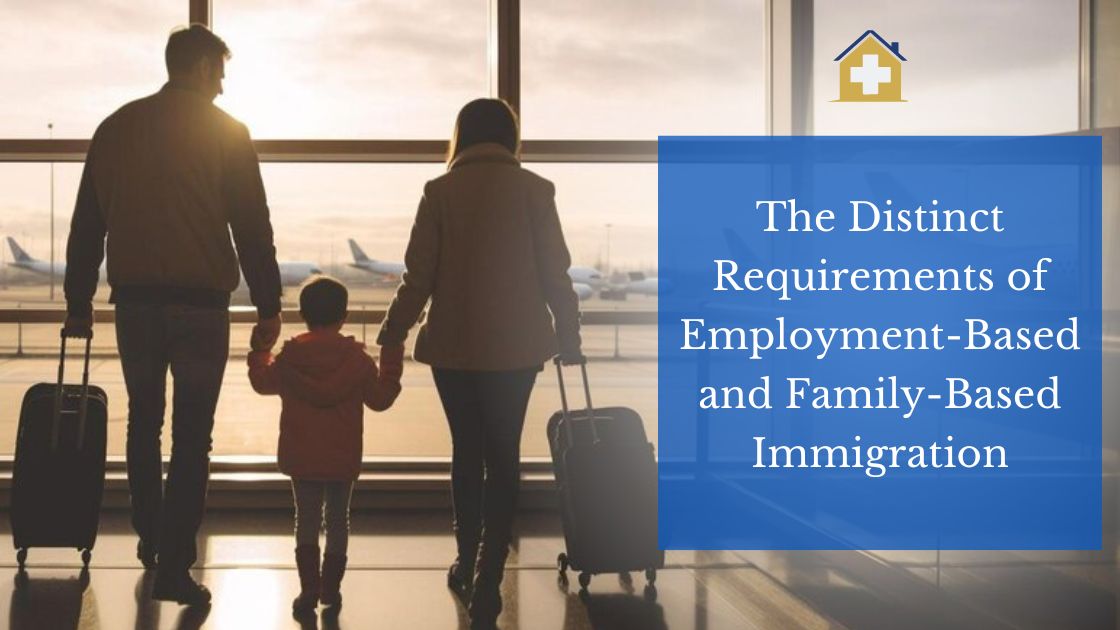Disclaimer: This article offers general advice. It is not a substitute for the advice of an attorney specializing in immigration law. Read more
Foreign individuals seeking legal entry into the United States have several options. The most common pathways include employment-based and family-based immigration, annually contributing to 140,000 and 732,000 visas, respectively. Each route has distinct requirements and regulations.
Understanding Family-Based Immigration and Employment-Based Immigration
Family-based immigration allows US citizens and lawful permanent residents to sponsor certain family members for green cards, enabling them to live and work in the country. This category is based on keeping families together and reuniting loved ones.
Employment-based immigration focuses on bringing in skilled workers who can work for the sponsored employer for a specified timeframe. This category includes various visa preferences for individuals with different levels of education, skills, and professional backgrounds.
What Constitutes “Family” Under Family-Based Immigration?
The citizenship status of the sponsor determines which family members can be sponsored for family-based visas. For example, United States citizens have the right to file a petition for their parents, siblings, spouses, and children. However, legal permanent residents are only eligible to petition for their spouses and children.
What Constitutes “Employment” Under Employment-Based Visas?
Five categories of employees are considered eligible applicants for employment-based immigration, including:
Category 1
- Individuals having extraordinary ability in the arts, sciences, business, education, or athletics
- Multinational managers or executives
- Outstanding professors and researchers
Category 2
- Professionals with an advanced degree
- People with exceptional ability
Category 3
- Professionals
- Skilled workers
- Unskilled workers
Category 4
- Special immigrants (broadcasters, former employees, foreign medical graduates, surviving spouses of deceased international organization employees, etc.)
Category 5
- Immigrant investors in new companies in the US that create job opportunities
Who Is Eligible to Apply for a Family-Based Visa and Employment-Based Visa in the US?
To be eligible for a family-based visa, one must be sponsored by an immediate relative who is:
- A citizen of the US or lawful permanent resident of the US
- 21 years of age
To be eligible for an employment-based green card, you must:
- Have a job offer from a US employer
- Have the education, skills, or work experience stipulated by the specific visa category for which you are applying
What to Know When Filing for a Family-Based Visa and Employment-Based Visa?
When filing for a family-based visa, you must:
- File Form I-130: Begin your application process by filing the permanent resident Form I-130.
- Wait for Visa Availability: Even if your petition is approved, you must wait for a visa to become accessible. The duration of this wait depends upon your filing date, country of origin, and visa preference category.
- File for Lawful Permanent Resident Status: After the visa becomes available, one may apply for a change in status to become a lawful permanent resident. Depending on the circumstances, one may either request an adjustment of status (this applies if the applicant is already in the US through a non-immigrant visa) or go through the consular process (this applies if the applicant is not in the US and has to go to the US Embassy in the applicant’s home country).
When filing for an employment-based visa, you must have:
- An employment offer in the US.
- A Form I-140, an authorized petition by the US Citizenship and Immigration Services to ensure your eligibility for that particular job.
- A labor certification from the department of labor stating that your employer pays an appropriate salary for the offered position.
Tips for the Interview for Visa Applicants
- Speak Clearly and Concisely: Visa interviews usually last 5-10 minutes, so convey the critical details of work or education clearly and precisely.
- Be Confident: No one knows your education or job better than you, so confidently discuss them with the officer.
- Present a Good Look and Attitude: Present yourself neatly, maintain a positive tonality in your communications, and don’t get irritated during the interview.
- Be Truthful and Accurate: Don’t misinterpret or disclose any fake information, as it can lead to denials of current and future visas. If the officer is not audible, or if you are unsure about the question, you can ask the officer to repeat or clarify.
- Keep All Required Documents Handy: Ensure you have all the required documents and evidence ready to be submitted.
- Make Sure Your English Language Skills Are the Best They Can Be: Visa interviews are conducted in English, so if English is not your native language, learning and practicing how to present your responses in English concerning work experience, job, and education is an absolute must.
Contact Dr. Steven Wittenberg Gordon for Your Immigration Medical Exams
If you need medical exams for family-based or employment-based visa applications, Dr. Steven Wittenberg Gordon is at your service. With years of experience in conducting medical evaluations for visa applicants, he ensures that all requirements are met to expedite the immigration process. Contact us today to get started!


